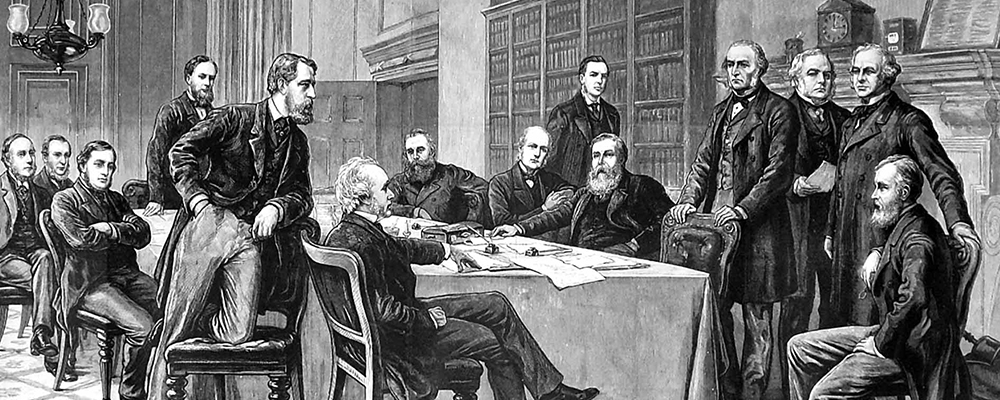Causes Of The Outbreak

The Official View
The Royal Commission on the Police Force of Victoria, 1881
Source: Royal Commission on the Police Force of Victoria: Second Progress Report, in Victorian Parliamentary Papers, 1881, Vol. 3, pp. 3ff.
In the opinion of your Commissioners, the abolition of the Glenmore station, the reduction of the numerical strength of the force in the district, and the substitution of inexperienced and inferior constables for those more competent, necessarily weakened that effective and complete police surveillance without which the criminal classes in all countries become more and more restive and defiant of authorities. The incident, however, which seems to have more immediately precipitated the outbreak was the attempt of Constable Fitzpatrick to arrest Dan Kelly, at his mother\’s hut, on the 15th of April 1878.
The constable appears to have borne a very indifferent character in the force, from which he was ultimately discharged. Mr. Fosberry, the Inspector-General of Police, New South Wales, and Captain Standish express in strong terms their adverse opinions of Fitzpatrick, while the present Acting Commissioner of Police, Mr. Chomley, writes a valedictory memo, on his papers, describing him as a liar and a larrikin.
To this man was entrusted, in April 1878, the temporary charge of Greta, the very focus of crime in the district. He had been stationed at Benalla, and prior to starting for Greta he appears to have had an interview with Sergeant Whelan, the sub-officer in charge, relative to his duties. Whelan, in his evidence, is somewhat contradictory upon the point as to whether Fitzpatrick was justified in attempting to arrest Dan Kelly under the circumstances. In almost the one breath he states that the constable was wrong in going to the Kelly\’s hut, and then and then urges that it was his duty to act as he did. The arrest was attempted to be made in consequence of a Gazette notice to the effect that a warrant had been issued at Chiltern against Dan Kelly and Jack Lloyd, on a charge of suspected cattle stealing. Sergeant Lynch, at Chiltern, considered that the men alleged to have been seen driving certain horses through the township answered the decription of those men, and warrants for their arrest were issued accordingly.
Not one friend of the outlaws, or one sympathiser, was called to give evidence. Kelly’s own accusations regarding the stock protection societies and what amounted to flagrant prejudicing of the law went ignored. To the root cause of the outbreak – the systematic subversion of a whole series of Land Acts by the North East squatters aided by the police – the Commission gave not the least recognition. By its every action except the reply to Mr Dixon, the Commission revealed its approval for the official policy of ignoring the rights of the cocky farmers at the same time elevating into a major crime any infringement of the squatters’ interests. As if to prove the point, Hare had emerged with the fattest pocket.
Max Brown Australian Son
Fitzpatrick\’s efforts to fulfil what he may have considered his duty proved disastrous. He was entrapped by accepting the invitation to accompany Dan Kelly into the hut, where he was attacked by several members of the family, and shot in the wrist by Ned Kelly. Warrants were in due course issued against Fitzpatrick\’s assailants; and those arrested, including Mrs. Kelly and a relative named Williamson, were sentenced to long terms of imprisonment for the offence of assault with intent to kill. The alleged severity of the punishment inflicted upon the mother of the outlaws has been the subject of comment in the course of the inquiry, and Captain Standish considers that it formed one of the many causes which assisted to bring about the Kelly outrages. One point in this matter should not be overlooked. Jack Lloyd, who was implicated in the alleged case of horse stealing for which Fitzpatrick sought to arrest Dan Kelly, was subsequently taken into custody, and, the charge having been investigated, he was discharged.
There can be little doubt that Constable Fitzpatrick\’s conduct, however justified by the rules of the service, was unfortunate in its results. It may also be mentioned that the charge of persecution of the Kelly family by the members of the police force has been frequently urged in extenuation of the crimes of the outlaws; but, after careful examination, your Commissioners have arrived at the conclusion that the police, in their dealings with the Kellys and their relations, were simply desirous of discharging their duty conscientiously; and that no evidence has been adduced to support the allegation that either the outlaws or their friends were subjected to persecution or unnecessary annoyance at the hands of the police.
Link: Ellen Kelly Interview
